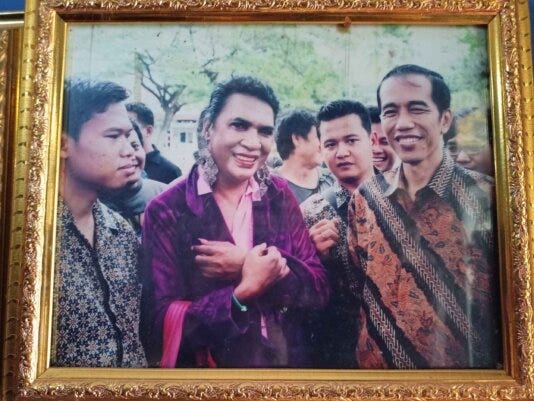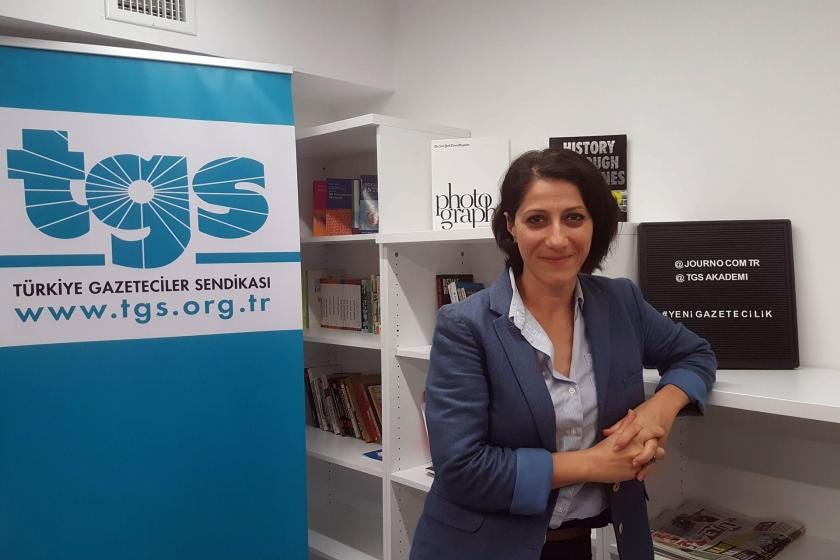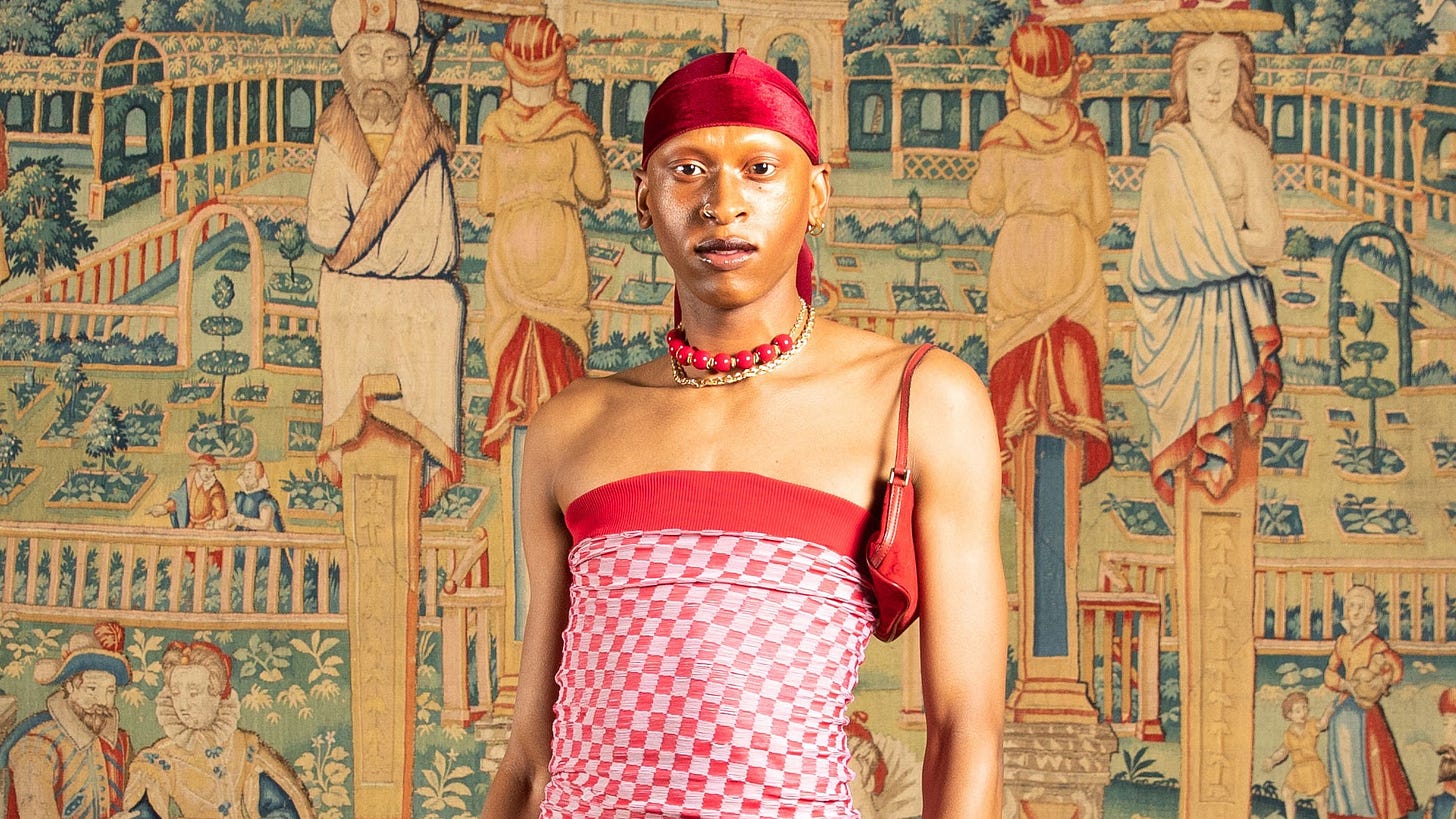Global Roundup: Iran Journalists, Indonesia First Trans Doctor, Burkina Faso Women’s Rights Activist, Turkey Women in Media, Black Trans Multimedia Artist
Curated by FG Contributor Samiha Hossain
Elaheh Mohammadi and Niloofar Hamedi as they were released from Evin prison in Tehran on 14 January. Photograph: Sahand Taki/Sharq news online/AFP/Getty Images
Two female journalists, who were released on bail from prison in Iran on Sunday, after spending 17 months in jail for reporting on the death of Mahsa Amini, have been charged under the country’s hijab laws after pictures were published of them celebrating their release with their heads uncovered. Niloofar Hamedi, 31, and Elaheh Mohammadi, 36, were met by a crowd of more than 100 family members and supporters outside Evin prison in Tehran when they were released, and were shown flashing victory signs.
Hamedi and Mohammadi were released on a 10bn toman bail after appealing against their sentences of 13 and 12 years respectively, which were handed down to them by a revolutionary court in 2023 after they were found guilty of spreading propaganda; committing a crime against national security; and collaborating with a foreign state. On Monday, the state-controlled Mizan news agency said that the two women have now been charged for not wearing a hijab after photos of them embracing and celebrating their release were widely circulated on social media.
Compulsory hijab is the main pillar of this gender apartheid regime. That’s why the authorities in Iran want to punish these two women, who resisted forced veiling and practised their civil disobedience. In the eyes of Islamic Republic officials they are criminals, but in the eyes of millions of Iranian women, they are our heroes. -Masih Alinejad, Iranian journalist living in exile in the US
Activists and human rights organisations say the state is taking an increasingly harsh stance against those who continue to refuse to comply with Iran’s mandatory hijab law. On Monday morning, the family of the human rights activist Narges Mohammadi, who was arrested and detained by the authorities last year, posted on Instagram that she has been sentenced to an additional year in prison on new charges of spreading propaganda against the Islamic republic while behind bars. The family added that Mohammadi, who was awarded the Nobel peace price in 2023, now faces “five convictions since March 2021, amounting to a total of 12 years and three months of imprisonment, 154 lashes, four months of travel ban, two years of exile” and several social and political prohibitions.
Photo by Dina Syah
Born in the interior of Asmat, Papua, Indonesia, 62-year-old Yulianus Rettoblaut said that during her adolescence, she had no understanding of what LGBTQ+ meant. She had no exposure to TV broadcasts and other media that spotlighted LGBTQ+ figures who she could look up to.
I was born and raised in a village where people did not know LGBTQ+ at the time, but I could feel what it was like to fall in love with someone of the same gender. -Mami Yuli
After four semesters in university, her parents in Asmat eventually discovered the truth about her gender expression, leading her father to stop funding her education. In Jakarta, Mami Yuli discovered the trans women's nightlife scene in Taman Lawang, an area once known for outdoor sex work. Realizing she wasn't alone provided comfort, as Taman Lawang became a space where she saw fellow trans women presenting themselves attractively. Inspired by peers earning a living there, she became interested in sex work.
Becoming a trans woman in Jakarta is not easy; we are often seen as criminals. Discrimination after discrimination is our daily bread. -Mami Yuli
Several years later in 2007, amid economic difficulties and discrimination stemming from the negative stigma against trans women, Mami Yuli decided to continue her educational journey up to the doctoral level. Mami Yuli said she envisions a future where other trans women can also achieve higher education, following in her footsteps.
Approximately 4,000 trans women are currently part of the Indonesian trans women Communication Forum (FKWI) led by Mami Yuli since 2005. Over 80 per cent of them are urban residents from various regions in Indonesia and more than 800 of them are elderly and live in poverty. Furthermore, Mami Yuli and FKWI built a shelter for elderly trans women in 2010 in Depok, West Java. Named "Anak Raja," the shelter currently accommodates 215 elderly trans women facing rejection and discrimination. It offers skills training, medical care and assistance with obtaining proper government identification and accessing social services.
This is my new family. This is my new experience. This is my support. For me, getting to know Mami is extraordinary. -Kak Elvi, trans woman living in Anak Raja
Courtesy of Maimouna Ba
Today, Burkina Faso is facing numerous conflicts, especially violent extremism. A significant part of the country is under the control of armed groups: 26 cities in the Sahel are under blockade, except for four to six cities, where people can travel, but only through humanitarian or military flights. There are over 4,000 closed schools. People were forced to flee their original areas and settle in relatively more stable zones. Hundreds of thousands of people find themselves entirely vulnerable.
The situation has led Ba and her colleagues to found Femmes pour la dignité au Sahel (Dignity for the Women of Sahel). Some of the challenges they hope to address include: education, economic empowerment, combating gender-based violence (GBV), engagement, leadership, and rebuilding a certain peace and social cohesion among communities. Ba mentions how many people currently face restrictions on their freedom of expression, and numerous organizations struggle to function. For this reason, they launched a program called "Promotion des droits humains et de l'espace civique au Sahel par des femmes” (Promotion of Human Rights and Civic Space in Sahel by Women). This project, which started in December 2022, targets women who did not have the chance to go to school.
Most of these women have never heard of human rights or the mechanisms to protect them. We’re working on collecting their testimonies to know how to best help them move forward in protecting their rights and seeking recourse in case of violation. -Maïmouna Ba
Other projects the organization runs are "Un enfant, un parrain" (One Child, One Sponsor) to support orphaned children displaced in the area; a fundraising campaign based on a traditional economic uplift technique called "haɓɓanaye; a young girls leadership program in schools; and "Un arbre, un enfant" (One Tree, One Child) program.
Ba, who has written a book titled Quelques pages de la vie d’une activiste (A Few Pages From the Life of an Activist) where she shares more of her experiences,.wants the work to continue and to create a generation of young women who will continue to fight for the ideals of the organization. She acknowledges that it is difficult when the organization cannot provide her colleagues with financial security.
Banu Tuna by Evrensel
When it comes to gender equality in Turkish media, men are still dominating managerial roles, research by a journalist union has found. The Journalists' Union of Turkey, known as the TGS, released its latest findings on gender disparities in Turkish media to mark the country's Working Journalists' Day last Wednesday.
The union analyzed 10 newspapers, 10 TV channels, four news agencies and six news websites. Nearly half of the journalists in Turkey are women, but the survey showed that only four women hold senior positions such as editor in chief or managing editor among Turkey's leading newspapers. The research also showed that only a few women hold senior positions in the TV channels' organizational structures, and those who do tend to work in advertising or public relations departments.
The gender imbalance adds to challenges for Turkish journalists, who watchdogs say already contend with censorship and political and legal pressure. Another issue is the cost of living, with most media outlets based in Istanbul, the largest and most expensive Turkish city.
Ceren Sozeri, an associate professor of communication at Galatasaray University in Istanbul, said that women often have to balance their journalism career with domestic roles. He For She Turkey, a United Nations-initiated project, states that women do three times as much unpaid house and care work as men worldwide, while this discrepancy reaches almost five times more unpaid house and care work for women in Turkey. Banu Tuna, the TGS secretary-general who has worked in journalism for 25 years, said that the media sector is male-dominated. She believes having more women in leadership in media would be a positive move.
If there were more women in executive positions, if the few rising women were not expected to become masculinized, I'm sure a lot would change in the Turkish media. The biggest problems today are not getting equal pay for equal work, not being able to work in managerial positions, and all kinds of gendered violence. If the media were not a boys' club, all these problems would be improved. -Banu Tuna
Multimedia artist Golden discusses the familial relationships that make their work possible, the revelatory power of self-portraiture, and ongoing solidarity between Black and Palestinian communities on Them. Born and raised in Hampton, Virginia, with roots in Pocomoke City, Maryland, their work combines photography, performance art, and poetry to explore queer imagination and Black love in the United States. Using their family's archives as a guide — whether overflowing wedding albums or images made by their Pop Pop Edison, who is also a photographer — Golden weaves together and resurrects long suppressed histories.
Golden says that their creative practice is guided by the scholar Christina Sharpe’s concept of “wake work,” which they describe as the desire to create something new “amidst the sea of anti-Blackness that makes America and the world possible.” In this way, the mundane — documenting the intimacies of Black family life — becomes sacred ground upon which to gather the memories and dreams that white supremacy has stolen.
This year, as a recent recipient of the Queer|Art Illuminations Grant for Black Trans Women Visual Artists, Golden completed their debut solo exhibition, I’m Never Alone at the Brookline Arts Center. They are also working on their second book of poetry, REPRISE, which will follow 2022's A DEAD NAME THAT LEARNED HOW TO LIVE, and will be published with Haymarket Books in 2025.
I feel like my practice first and foremost is about relationships. It's about relationships with self, to family, to friends, but I feel like because all my work is inspired by where I grew up, that’s naturally a huge part of it. -Golden
Golden, who is alo an organizer, discusses how Palestine, Sudan, Congo, LGBTQIA people and trans individuals being targeted by the state, women being targeted by Roe v. Wade are all interlocked. Social justice and collective liberation is what keeps them going and they constantly ask themself “ What is my responsibility? What is our responsibility?”
I think about Nina Simone, who says an artist’s job is to reflect the times. Even today, thinking about how we're doing this interview, and over the last couple hours, Harvard's (first) Black president just resigned. It just reminds you that no matter where you are, no matter what your job is, Black people, people of color, and LGBTQIA people aren't free until we're all free. -Golden
Samiha Hossain (she/her) is an aspiring urban planner studying at Toronto Metropolitan University. Throughout the years, she has worked in nonprofits with survivors of sexual violence and youth. Samiha firmly believes in the power of connecting with people and listening to their stories to create solidarity and heal as a community. She loves learning about the diverse forms of feminist resistance around the world.







It is always uplifting to read these stories, even the difficult ones. They celebrate women's strength. Thank you.